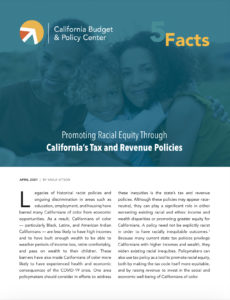 Promoting Racial Equity through California’s Tax and Revenue Policies
Promoting Racial Equity through California’s Tax and Revenue Policies
California Budget and Policy Center
First published April 2021
Legacies of historical racist policies and ongoing discrimination in areas such as education, employment, and housing have barred many Californians of color from economic opportunities. As a result, Californians of color — particularly Black, Latinx, and American Indian Californians — are less likely to have high incomes and to have built enough wealth to be able to weather periods of income loss, retire comfortably, and pass on wealth to their children. These barriers have also made Californians of color more likely to have experienced health and economic consequences of the COVID-19 crisis. One area policymakers should consider in efforts to address these inequities is the state’s tax and revenue policies. Although these policies may appear race-neutral, they can play a significant role in either worsening existing racial and ethnic income and wealth disparities or promoting greater equity for Californians. A policy need not be explicitly racist in order to have racially inequitable outcomes. Because many current state tax policies privilege Californians with higher incomes and wealth, they widen existing racial inequities. Policymakers can also use tax policy as a tool to promote racial equity, both by making the tax code itself more equitable, and by raising revenue to invest in the social and economic well-being of Californians of color.
Download Resource